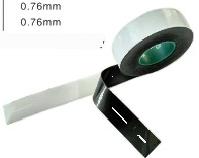The Advantages and Applications of Self-Annealing Tape
In today's fast-paced industrial landscape, the demand for innovative materials that enhance efficiency and performance is ever-increasing. One such revolutionary product that has gained significant attention is self-annealing tape. This specialized tape combines adhesive properties with thermal management, making it an excellent choice for various applications across diverse industries. In this article, we will delve into the characteristics, advantages, and applications of self-annealing tape, highlighting its pivotal role in modern manufacturing and repair processes.
Understanding Self-Annealing Tape
Self-annealing tape is a unique type of tape that incorporates advanced thermal properties, allowing it to transition from a solid adhesive form to a semi-liquid state upon heating. This transformation occurs at specific temperatures, enabling the tape to conform to various surfaces and fill in gaps or irregularities, thereby creating a robust bond. The self-annealing process enhances the adhesive's ability to establish a strong connection with substrates, making it ideal for applications where traditional adhesives may fall short.
Advantages of Self-Annealing Tape
1. Thermal Performance One of the most significant advantages of self-annealing tape is its exceptional thermal performance. The tape can withstand high temperatures, making it ideal for applications in environments where other adhesives might fail due to heat. This durability ensures a longer lifespan and reliability of the bond, reducing maintenance costs in the long run.
2. Versatility Self-annealing tape is highly versatile and can be used across various industries, including automotive, aerospace, electronics, and construction. Its ability to bond different materials, such as metals, plastics, and glass, makes it a go-to solution for many manufacturing and repair tasks.
3. Ease of Use The application process of self-annealing tape is straightforward. It does not require extensive surface preparation or special tools, making it accessible for quick repairs or installations. Users simply need to apply the tape to the desired area, heat it to the recommended temperature, and allow it to cool, resulting in a strong and durable bond.
4. Environmentally Friendly Many self-annealing tapes are designed with eco-friendliness in mind, made from non-toxic materials and free from harmful solvents. This commitment to sustainability aligns with the growing trend of businesses prioritizing environmentally responsible practices.
self annealing tape

5. Enhanced Adhesion The self-annealing feature of the tape allows it to fill gaps and imperfections in surfaces, creating a more effective bond than traditional tapes or adhesives. This enhanced adhesion is particularly beneficial in demanding applications where mechanical stresses may be present.
Applications of Self-Annealing Tape
1. Electronics In the electronics industry, self-annealing tape is often used for insulation and protection of components, providing excellent thermal management for circuit boards and other sensitive areas. Its ability to withstand high temperatures is essential for devices that generate heat during operation.
2. Automotive In automotive manufacturing and repair, self-annealing tape is employed for sealing and insulation purposes. It can effectively bond automotive components, providing durability and resilience against thermal expansion, vibrations, and environmental factors.
3. Aerospace The aerospace sector leverages self-annealing tape for its lightweight and high-performance characteristics. It is used in various applications, including wire harnessing, thermal insulation, and component bonding, where reliability and performance are critical.
4. Construction In construction, self-annealing tape is utilized for plumbing and HVAC systems, providing airtight seals and insulation. Its ability to withstand moisture and heat makes it suitable for various construction applications.
Conclusion
Self-annealing tape represents a remarkable advancement in adhesive technology, offering a multitude of benefits across various industries. Its exceptional thermal performance, versatility, ease of use, and environmental friendliness make it an invaluable tool for manufacturers and repair professionals alike. As industries continue to evolve, the applications of self-annealing tape are expected to expand, paving the way for innovations that enhance efficiency and effectiveness in numerous sectors. With its proven capabilities, self-annealing tape is surely a product that will shape the future of adhesive solutions.
-
XIANGFAN Rubber Tape-Ultimate Solutions for All Your Insulation NeedsNewsJun.24,2025
-
XIANGFAN Rubber Tape-Protection for Industrial and Residential ApplicationsNewsJun.24,2025
-
XIANGFAN Rubber Tape: Superior Safety and Sealing for Demanding EnvironmentsNewsJun.24,2025
-
XIANGFAN Rubber Tape: Reliable Solutions for Every Electrical ChallengeNewsJun.24,2025
-
XIANGFAN Electrical & Industrial Tape: Powering Reliability Across IndustriesNewsJun.24,2025
-
XIANGFAN Electrical & Industrial Tape: Excellence in Every ApplicationNewsJun.24,2025
